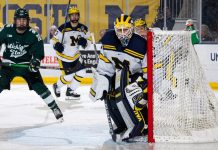
The comeback.
In some sports, like basketball, rallying from a deficit in a game is no big deal.
In football, you don’t put a lot of faith in a statistic about teams holding the lead at halftime. Same goes for baseball, where the only place you really worry about blowing a lead is when your closer is in the game.
But hockey is a different animal.
When leading after two periods, teams typically close out those wins at rates in excess of 85 percent. For some teams, that number creeps north of 90 or 95 percent.
In this Hockey East season, though, the ability of teams to erase deficits has been something to notice.
Just take last weekend as an example.
Last Friday, UMass Lowell trailed New Hampshire 2-0, but scored two goals in 27 seconds with the goaltender pulled to even things and earn a tie.
A night later, the same River Hawks team led 3-1 and 4-2 in the third period at Northeastern only to watch the Huskies rally to tie the game and win in overtime.
Both of those teams put together rallies that, as a coach, you can’t depend on, but when the day is over, you celebrate.
But then there was Providence.
In a two-game series against Massachusetts, the Friars fell behind 2-0 in the opening period both nights. Each game, Providence battled back to tie things and had so much momentum that the game-winning goal felt imminent.
Both nights, though, UMass found a way to win, each time floating shots from the point through traffic to find the back of the net in the closing minutes.
So while rallies and comebacks are electric and often, if you’re the home team, can really pump up your home crowd, most coaches would prefer to not need them.
“It was an exciting hockey game for fans, not for coaches,” UMass Lowell coach Norm Bazin said after his team rallied from 2-0 down in the closing minutes for a tie against New Hampshire. “It’s a good test of resolve. We’ve got a lot of young guys in the locker room and they’re looking for guidance. And I thought some of the upperclassmen were very slow in starting. Many of them had slow starts and that’s who I look to. We have to have a better start in Hockey East if we’re going to have success.”
Northeastern coach Jim Madigan, who one night later turned the tables on Lowell and not just rallied from two goals down in the third but found a way to win in overtime, was excited for his team’s ability to never say die.
It was the third time in four home games that Northeastern came from behind in the third period to earn a victory.
But as Madigan was very clear about, that’s not a recipe for success.
“It’s not how you want to draw it up, that’s for sure,” said Madigan of not one, but two, come-from-behind victories in the third period this weekend. “If you rely on having to come back all the time, you’re not going to be successful in this league.
“We’ve got to get back to some better starts. We had some better starts in our first four games.
“But it’s a resilient group. It’s a group that works extremely hard and they take pride in being the hardest working team on the ice each game we play.”
Madigan, though, is quick to exert the fact that his team plays on very thin ice when it doesn’t start well.
This season, when trailing after two, Northeastern is a remarkable 4-2-0. But in the previous three seasons, they were a combined 4-22-6, a record much more in line with the norm in college hockey.
“We continue just to chip away at it and find a way to win,” said Madigan. “Early on, a lot of teams are trying to find their identity, so it is a little easier to come back from a two-goal deficit, because systems and structures aren’t in place. That’s what we’ve been able to take advantage of thus far.
“As you go along, it’s harder to win games. Teams have much more structure and are able to protect one- and two-goals leads later in the season. We don’t want to get ourselves in that situation. The players know that.”
The other aspect of a comeback is the need for your team to play perfect while facing a deficit. One more goal often turns into a dire outcome. Those are razor-thin lines teams don’t want to walk.
“When you’re behind two goals, there’s zero margin for error,” said Madigan. “If you give up another goal and you’re down by three, you’re not coming back.
“It’s hard to play the game with zero margin of error, because you don’t put your best foot forward. We’ve been able to do it, but it’s usually not a recipe for success.”
Case in point: Providence.
The Friars played two solid games against UMass this weekend, holding a 31-21 margin in shots in game one, and a 31-13 edge in the back end of the home-and-home in Providence.
While sometimes shot differential doesn’t match the play on the ice, in these two games Providence was dominant at times, particularly late in games.
But for the Friars, both nights a 2-0 deficit in the games hurt them. Sure, they rallied to tie both games, but in two matchups featuring little in the way of open ice and top-notch scoring chances, Providence’s edge should have held.
Except for the fact they fell into large holes each night.
“We spotted them two goals,” said Providence coach Nate Leaman after Saturday’s loss. “I was proud of the way we fought back, but at the end of the day it comes down to one shot.
“That’s the game. We can’t spot them two goals early.”
At the end, is there a formula? Sure. Don’t fall behind.
And for the teams that take leads, it takes 60 minutes of play.
Certainly, comebacks are exciting and we’ve probably seen more than our fair share early in the Hockey East season. But in reality, the teams that put forth 60-minute efforts almost never need a comeback and will successfully protect leads.
Those are the championship teams.


